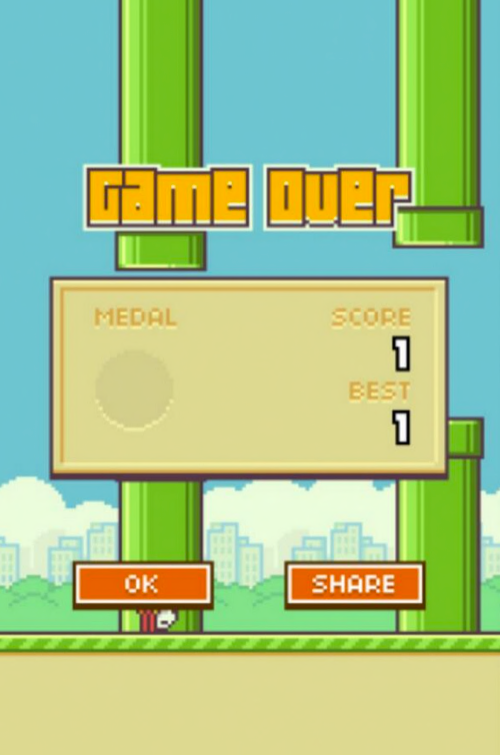Flappy Bird is the latest weirdly addicting game to captivate mobile users. The reason is simple, if not straightforward: In the guise of a cartoonish time-waster, Flappy Bird offers some of the most punishing, hardcore gameplay you can imagine. And it’s sucking in players by the millions.
Flappy Bird rakes in a reported $50,000 per day through in-app ads and at the time of writing, it holds the coveted number one slot in the iOS App Store. In the latest manifestation of the game’s strange success, players are flocking to social media to post their high scores (mine is 4). A search on Instagram for the hashtag #flappybird yielded 826,956 “game over” screenshots.

Flappy Bird seems really simple, and it is: tap the screen to avoid obstacles (Mario-style green pipes) and keep your pixelated bird in flight for as long as possible. Hit anything and your bird drops to the ground. Game over.
The physics are lifted straight out of a Mario Bros. underwater level, but Flappy Bird is nowhere near as forgiving as that classic. The gameplay is a psychologically punishing blend of ruthless difficulty and incredible simplicity.
Flappy Bird actually picks up its torch from a long line of similarly unforgiving, albeit more obscure, games. Flappy Bird just turned over 50 million unsuspecting casual mobile users into bonafide hardcore gamers. This ain’t no Candy Crush Saga.
Flappy Bird’s Punishing Lineage
Everything about Flappy Bird is derivative, from the Mario-style sprites right down to its “one strike and you’re out” gameplay formula. The interesting part is that those unoriginal components are remixed into a very simple product that has even the most casual mobile gamers absolutely hooked.
But simple and easy aren’t at all synonymous. Flappy Bird offers a brutal flavor of gameplay that rewards extreme precision and little else. The game is randomly generated anew each time your bird thwacks into the game over screen, so you can’t just memorize a level sequence to improve.
Flappy Bird, unbeknownst to most of its addicts, distills the formula for a hardcore game right down to its core. Precision and permadeath are the only two constants; screw the first one up and it’ll rapidly reward you with the latter.
“Permadeath,” a staple of only the most hardcore gameplay, is exactly what it sounds like. There are no saved games, no rush of relief at reaching a safe checkpoint and knowing your progress won’t be lost. Permadeath, like Flappy Bird, offers players no safe harbor at all—and that’s part of its twisted, addictive calling card.
Cheating Death Is Not An Option
In Flappy Bird, there is no boss, no treasure chest, nothing to play for at all, save your own burning psychological drive to not screw it up. It requires a fascinating exercise in mental exceptionalism paired with a powerful suspension of disbelief—namely, ignoring the fact that, at some point, you will indeed screw it up.
Flappy Bird, in all of its ripped-off glory, calls to mind some of the most challenging games ever made. In the infamous “roguelike” genre, which has its roots in the ancient ASCII game Rogue (1980), the player is tasked with wending through a randomly generated virtual dungeon until one fatal misstep leads to—you guessed it!—permadeath. Later, 2009’s Demon’s Souls earned its place as perennial entry on lists of the hardest video games ever made.
Plenty of games are really, really hard and keep gamers coming back for more, though most, like the Monster Hunter series, reward players for honing their skills to razor-sharp precision over time. Flappy Bird is decidedly more masochistic, a mass un-kickable bad habit perpetuated via internet virality.
Flappy Bird’s unpredictable popularity is no doubt fueled by the core tenets of those ultimate hardcore games that gamers love to hate (and in turn, love). The natural social media pop-up communities for viral phenomena serve as a Web-wide commiseration platform, adding fuel to Flappy Bird’s unlikely, perhaps undeserved fire.
But like so many brave hardcore gamers before us, we persevere: tap, tap, tapping our way toward the unobtainable— and inexplicably loving every second of it.





















